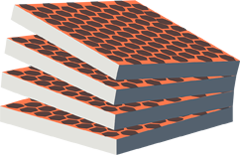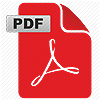APR 1, 2025
United States Patent Granted, 12,263,278, REITH et al.
Additively Manufactured Porous Polymer Medical Implants
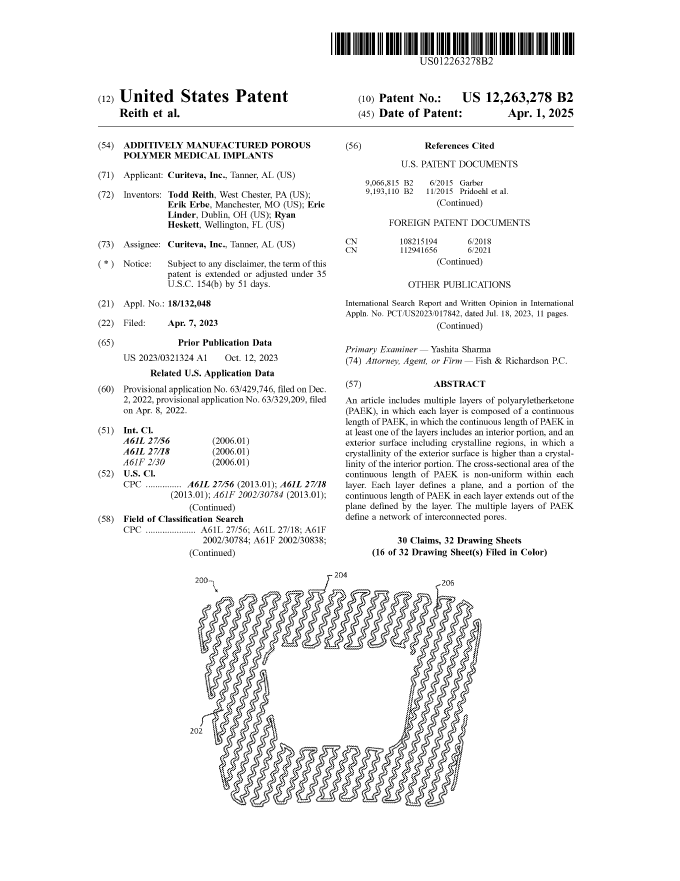
SEP 2024
"Implants Now in Production" - [AM] Additive Manufacturing Magazine September 2024, Volume 13, Number 5
Medical device manufacturer Curiteva is producing two families of spinal implants using a proprietary process for 3D printing porous polyether ether ketone (PEEK).
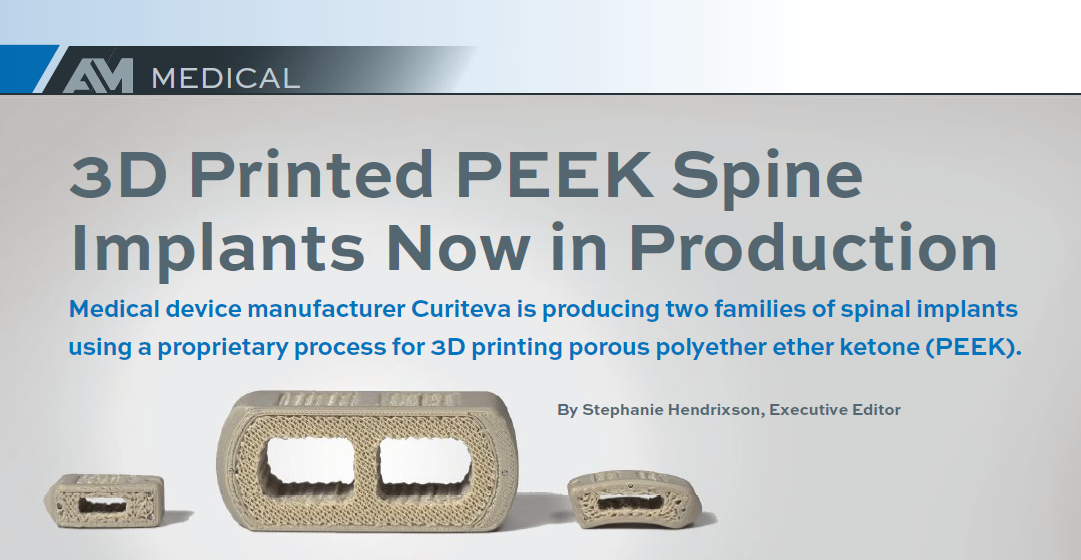
AUG 2024
"Quantum leap for spinal implants from the 3D printer" - Elements Audio Interview, Evonik Corporation
Perseverance and the belief in a revolution in orthopaedics: both are driving the inventor and start-up entrepreneur Todd Reith from the USA. Together with Evonik, he has developed a process with which spinal implants can be 3D printed from polyether ether ketone (PEEK).
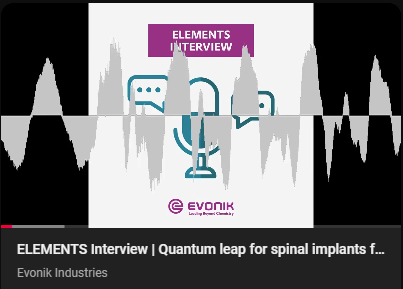
JUN 15, 2024
"Close to the Bone" - Elements Magazine, Evonik Corporation
Together with an ambitious inventor and entrepreneur, Evonik has developed a thermoplastic, that allows the manufacturing of 3D-printed implants that could improve the health of patients.
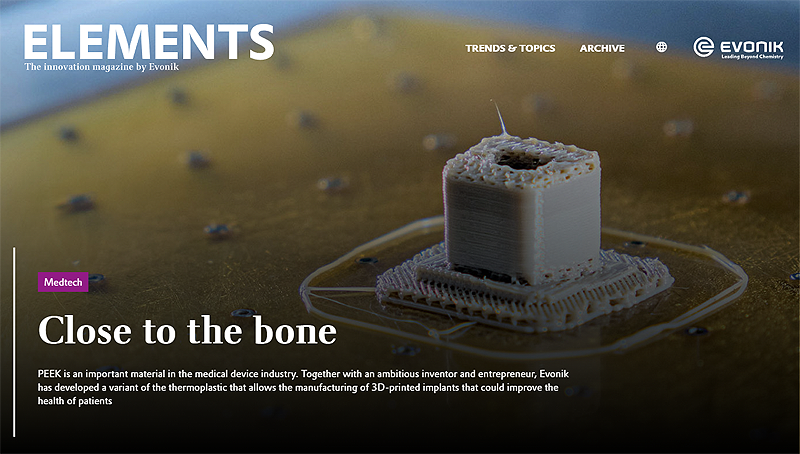
JUN 6, 2024
The Cool Parts Show - 3D Printed PEEK Spine Implants in Production
The Cool Parts Show, BONUS episode of #63. The Cool Parts Show visits Huntsville, AL and learns how medical device manufacturer Curiteva is applying a proprietary 3D printing process to produce spine implants from PEEK.
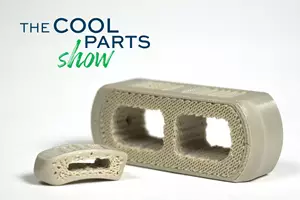
JAN 18, 2024
Curiteva, Inc. Receives FDA 510k Clearance for Inspire™ 3D Porous PEEK HA-FUSE™ Lumbar Interbody System
Curiteva Inc. Announces FDA 510(k) Clearance for Inspire™ 3D Porous PEEK HA-FUSE™ Lumbar Interbody System
SEP 28, 2023
Orthopedics This Week - Curiteva Master Class (Dr. Alex Vaccaro, Dr. Kevin Foley, Barbara Boyan, Ph.D., Erik Erbe, Ph.D.)
Structure Drives Biology, An Evolution in PEEK Implants - How Does 3D Printing Change PEEK implant Performance?
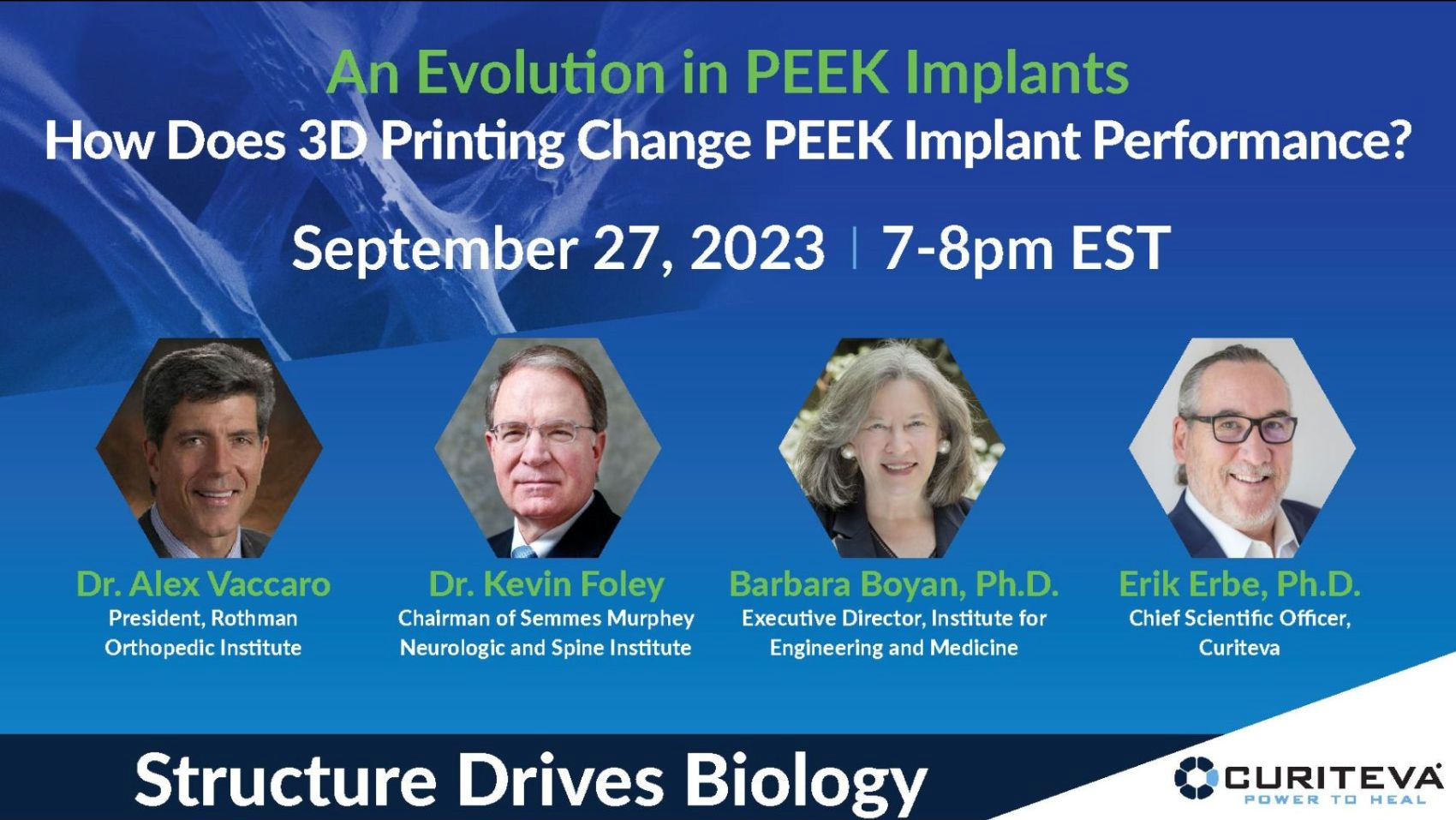
SEP 20, 2023
The Cool Parts Show - Improving Medical Implants with 3D Printed PEEK
The Cool Parts Show, episode #63. 3D Printing medical implants of Polyetheretherketone (PEEK) using a novel printing method called fused strand deposition (FSD).
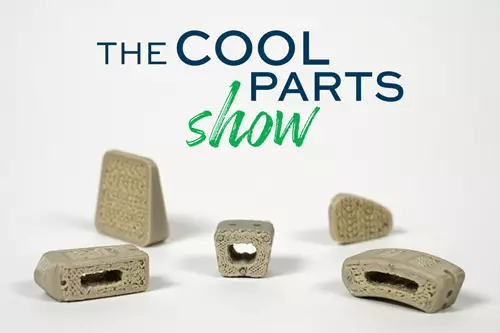
AUG 2023
[UPDATE] "3D-Printed Porous PEEK Pioneers Reach Spine Market" - Bonezone, Carolyn LaWell
Curiteva developed a fully interconnected and integrated porous interbody system for spinal fusion.
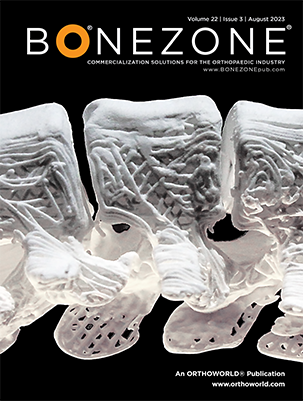
AUG 2023
"Going the Extra 10,000 Miles" - Bonezone, Carolyn LaWell
It was Christmas time, and Todd Reith was traveling with a very important package.

MAR 21, 2023
"3D-Printed Porous PEEK Pioneers Reach Spine Market" - Bonezone, Carolyn LaWell
Todd Reith thought that 3D-printed PEEK could revolutionize the spine industry. With a background as a software and manufacturing engineer, a maker of guitars, expandable titanium implants, and IndyCar parts, he started building a printer in his home lab
MAR 7, 2023
United States Patent Granted, 11,597,148, REITH et al.
System and Method of Manufacturing a Medical Implant
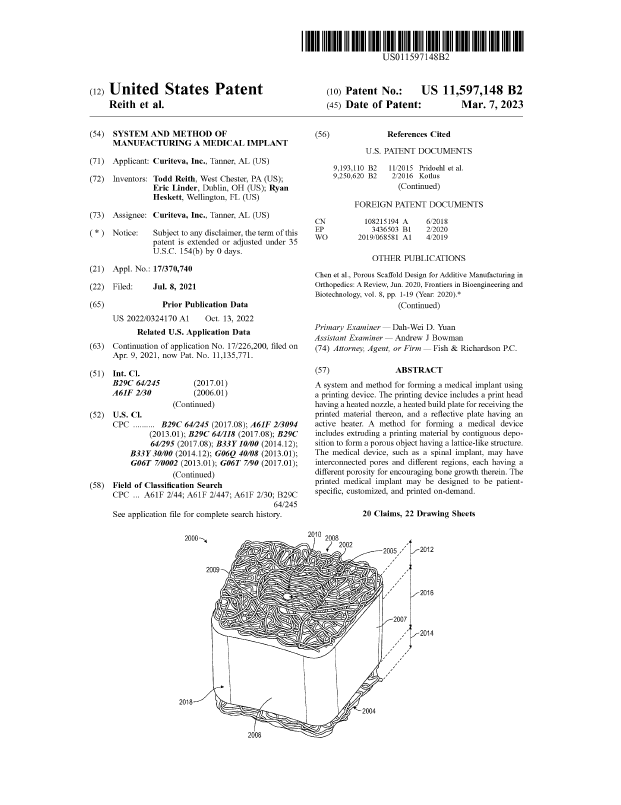
FEB 13, 2023
Curiteva, Inc. Receives FDA 510k Clearance for Inspire™ 3D Porous PEEK HA-FUSE™ Cervical Interbody System
Curiteva Inc. Announces FDA 510(k) Clearance for Inspire™ 3D Porous PEEK HA-FUSE™ Cervical Interbody System
OCT 25, 2022
United States Patent Granted, 11,481,886, REITH et al.
System and Method of Manufacturing a Medical Implant
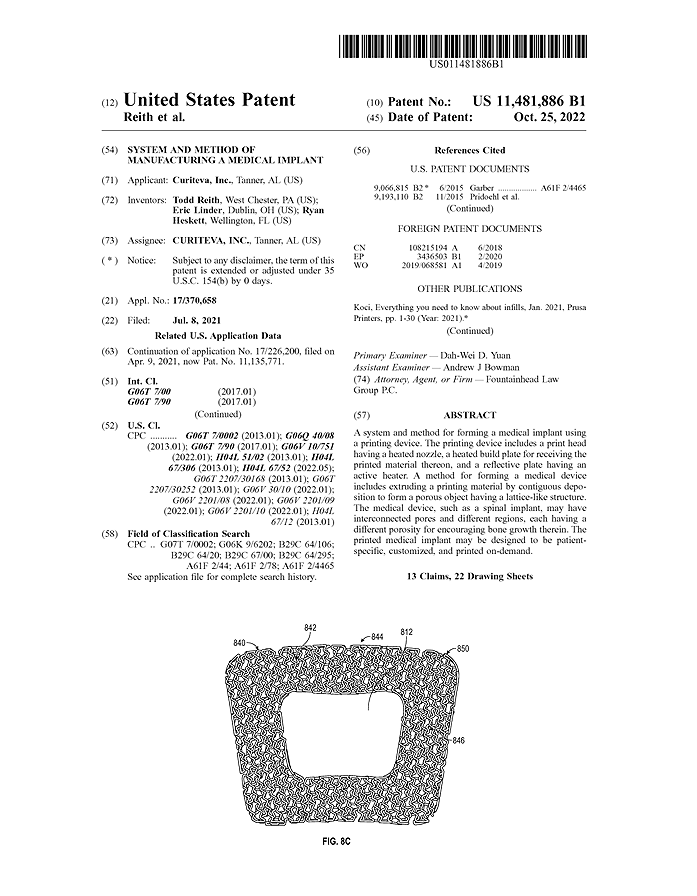
OCT 5, 2021
United States Patent Granted, 11,135,771, REITH et al.
System and Method of Manufacturing a Medical Implant
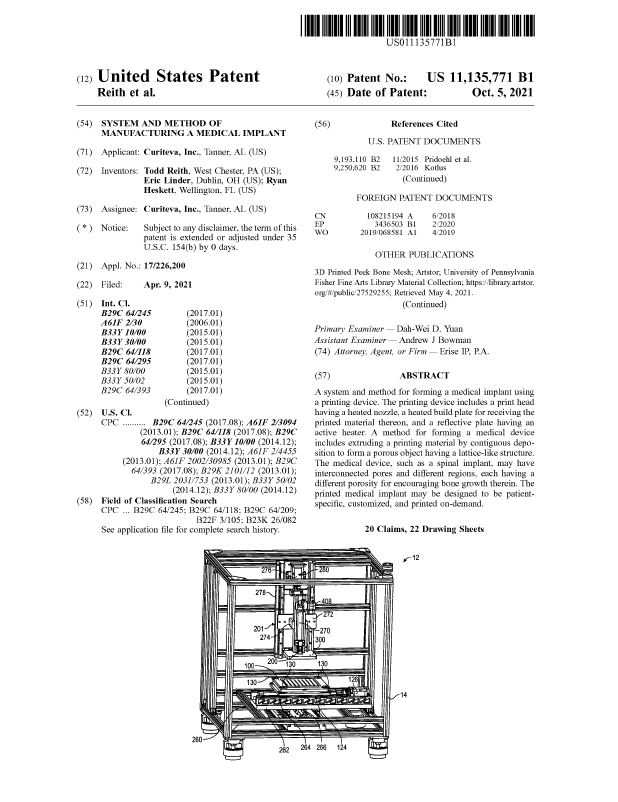
SEP 11, 2020
Curiteva, Inc. Acquires FossiLabs, LLC:
Redefines Active Implant
Huntsville, Alabama-based spine manufacturer Curiteva announced a marketshifting transaction with the acquisition of FossiLabs, a company focused on the development of Fused Filament Fabrication 3D printed PEEK medical implants.
Redefines Active Implant
MAR 06, 2020
FossiLabs Recognized by Manufacturing Technology Insights
TOP 10 3D Printing Solution Provider 2020

JAN 01, 2020
FossiLabs Offers 3D Printed 'Fully' Porous PEEK Bone-Like Scaffolding Structures
First-of-its-kind 3D printed PEEK porous medical implants with advanced hydrophilicty

SEP 21, 2019
FossiLabs 3D Printed PEEK Porous Bone HAnano Modified Surface Comparison
FossiLabs first-of-its-kind 3D printed PEEK porous medical implants with defined areas of full porosity and advanced hydrophilicty using HAnano modified surface.
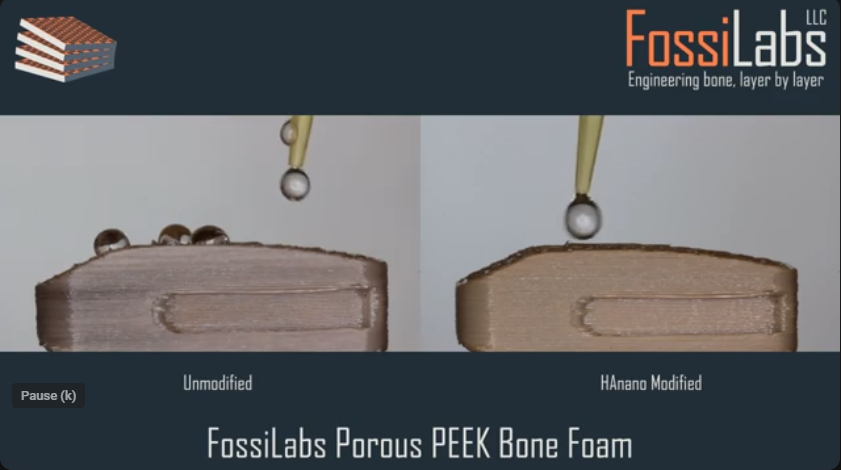
SEP 15, 2019
FossiLabs 3D Printed PEEK Fully Porous Implants
first-of-its-kind 3D printed PEEK porous Bone-FoamTM with advanced hydrophilicty featured at NASS 2019
NASS Annual Meeting, September 25-28, 2019
Evonik Corporation, Booth 2913
Promimic AB, Booth 3901
MAR 1, 2019
FossiLabs Featured 3D Printed Samples
Evonik's VESTAKEEP®world's first implant grade PEEK Filament
AAOS Annual Meeting, March 13-15, 2019
Evonik Corporation, Booth 4417
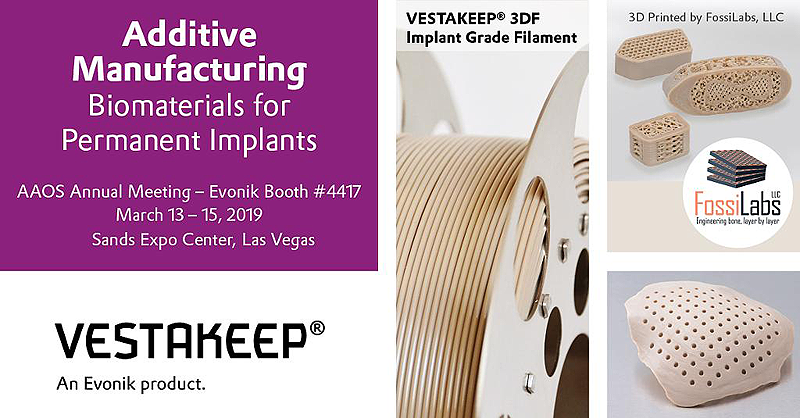
FossiLabs Featured 3D Printed Samples
Evonik's VESTAKEEP®world's first implant grade PEEK Filament
AAOS Annual Meeting, March 13-15, 2019Evonik Corporation, Booth 4417

Contact Us
SEND US A QUICK MESSAGE
